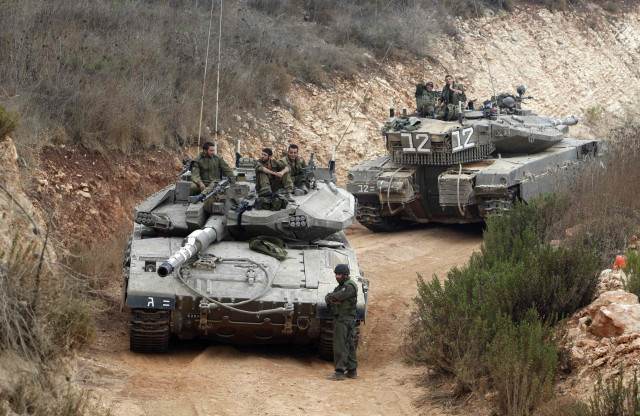Israeli troops redeploy on Lebanon border after fierce clash
Israeli troops were redeploying on Wednesday to the site of a deadly gunbattle along the Lebanese border.

Israeli troops were redeploying on Wednesday to the site of a deadly gunbattle along the Lebanese border in order to complete their interrupted mission to uproot a tree, army radio reported.
It said an important security cordon and armoured vehicles were deployed around the site. The military did not immediately confirm the report.
Following these reports, a Lebanese army spokesman told AFP that Lebanon stands ready to retaliate in the event of any new "aggression."
Israeli and Lebanese troops clashed on the two countries' border on Tuesday, raising concerns that a new round of fighting might erupt.
A senior Israeli officer, two Lebanese soldiers and a Lebanese journalist were killed in the exchange of fire, the most serious violence along the frontier since a 2006 war.
The United Nations and the United States urged both sides to show restraint. Hezbollah fighters, who battled Israel four years ago, took no part in the exchange of fire. But Hezbollah leader Sayyed Hassan Nasrallah said the group would not stand silent if Israel attacked the Lebanese army in the future.
Lebanon and Israel gave different accounts of the events leading up to the clash and the UN peacekeeping force in southern Lebanon said it had yet to ascertain the circumstances leading to the bloodshed. The Lebanese army said an Israeli patrol had crossed the technical line of the border although UN peacekeepers had told it to stop. "A Lebanese army force then repelled it using rocket propelled grenades. A clash happened in which the enemy forces used machine guns and tank fire targeting army posts and civilian houses," it said.
Major-General Gadi Eisenkot, head of Israel's northern command, said Lebanese snipers fired at officers inside Israeli territory. The Israeli army showed reporters blood stains outside a bunker some 100 metres inside its side of the border fence where it said the colonel was shot in the head and another officer was shot in the chest and seriously wounded.
"There were only two or three shots," said an Israeli military spokeswoman. "They were standing there, where the blood is." They were watching other troops move a cherry-picker crane next to a fence behind the demarcation line to trim a tree, whose branches were tripping the fence's electronic anti-infiltration devices, the spokeswoman said.
An Israeli tank was targeted by rocket-propelled grenade, he said, and the tank fired back and killed the RPG squad. "Israel has responded and shall respond aggressively in the future to any attempt to disrupt the calm along the northern border or to harm residents of the north or the soldiers protecting them," Israeli Prime Minister Benjamin Netanyahu said in a statement.
Security sources and witnesses said no more fighting took place but tensions remained high. There was no sign of any extensive Israeli preparations for a large-scale operation. Nasrallah said he did not think Tuesday's clash would lead to a bigger conflict. "I don't expect a war to happen soon ... but there are reasons for worry," he said.
UN, US call for “maximum restraint”
The United States, Israel's main backer, called for both sides to exercise restraint. "The last thing that we want to see is that this incident expand into something more significant," State Department spokesman PJ Crowley said in Washington.
The UN Security Council also voiced concern. "The members of the Security Council called on all parties to practice utmost restraint, strictly abide by their obligations under resolution 1701, observe the cessation of hostilities and prevent any further escalation on the Blue Line," Russian UN Ambassador Vitaly Churkin told reporters after a council meeting.
Security Council resolution 1701 halted hostilities in the Israeli-Hezbollah war in 2006 and banned all unauthorised weapons between the Litani River and the Blue Line, the UN-monitored border between Israel and Lebanon.
Tuesday's deaths were the first on either side since the 2006 war in which 1,200 people, mostly civilians, were killed in Lebanon, along with 158 Israelis, mostly soldiers. A new war could be more devastating than the last. Tension has increased since April, when Israel accused Syria of transferring long-range Scud missiles to Hezbollah in southern Lebanon -- an allegation Syria has rejected.
Israel has threatened to attack Lebanese infrastructure in any new conflict. In 2006 it bombed bridges, fuel tanks, radar stations and Beirut airport, while Hezbollah fired 4,000 rockets into Israel. Lebanon's Higher Council for Defence headed by President Michel Suleiman said it held Israel accountable for Tuesday's clash and it would complain to the UN Security Council.
Israeli complained to the UN Security Council over the clash, saying it held the government of Lebanon responsible. Hezbollah's Nasrallah, addressing tens of thousands of supporters via video link, said: "I say honestly, that in any place where the Lebanese army will be assaulted and there's a presence for the resistance, and it is capable, the resistance will not stand silent, or quiet or restrained." Syrian President Bashar al-Assad telephoned Suleiman to offer support and Prime Minister Saad al-Hariri spoke to a number of leaders, including French President Nicolas Sarkozy and asked for France's assistance in ending what he called "Israeli aggressive practices against Lebanon and its army".
Israel's shekel currency fell against the dollar over worries about the incident. But research firm Eurasia Group said that although it would raise diplomatic tensions, it was unlikely to lead to more fighting."



















COMMENTS
Comments are moderated and generally will be posted if they are on-topic and not abusive.
For more information, please see our Comments FAQ